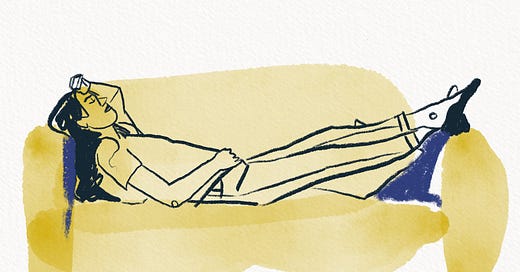Writing is joy that stems from discipline. For those of us who identify as ‘former fuck-ups’, we see the word discipline and think, ‘it’s only a matter of time until I fail.’
The good news is that a robust habit can quickly be re-established if there’s a bit of slippage.
Friction points are useful for both building desirable habits and breaking undesirable ones.
As you can probably intuit from the phrase itself, a ‘friction point’ is a moment in time during the lead-up to the activity where there is potential for resistance.
For example, I had slipped into the terrible habit of looking at my phone first thing in the morning. I took it with me into the bathroom. (Gross. I know. Sorry. I’m sure you’ve done it, too.)
I identified this as something that I wanted to stop. Our devices impact our autonomy. They tell us what to do. I wanted to have autonomy in the morning. Now, at night, when I charge my phone, I turn it off. It was difficult at first. I thought, “What if there’s an emergency in India and my family calls?”
But we can’t live as prisoners of this sort of emergency thinking.
Waking up, I found no desire to turn on the phone and carry it into the bathroom. In fact, I felt revulsion for the phone.
This friction point (turning on the phone) was so consequential, it allowed me to change the habit loop drastically.
Before:
Previous cue — going to the bathroom.
Previous behavior — reading news in the bathroom.
Previous reward — dopamine, I imagine.
Now:
Same cue — going to the bathroom.
New behavior — autonomously decide what I’d like to work on during my morning free-write.
Similar reward — dopamine, but from the feeling of autonomy (just guessing here).
I invite you to make two lists: habits you’d like to form/deepen and habits you’d like to disrupt.
Then, do the following:
Identify potential friction points for each.
List potential ways you can shorten/do away with the first set of friction points and how you can elongate the second.
Change your environment (move shit around in your house or office) in accordance with your list.
Keep your cues and rewards mostly the same.
Profit.
Notes:
Credit for this terminology around ‘friction’ as it relates to habit formation goes to Wendy Wood, professor at USC. Here is a great interview with her.
Credit for bad pop-science goes to me.
Written by Raghav Rao
Illustration by Sophie Lucido Johnson
Office of Modern Composition is a Chicago-based writing studio that both makes compositions and fosters composers. We offer one-on-one coaching for writers and also take on commissions for things you need to have written. We also offer free events, like our in-person and online co-writes.




